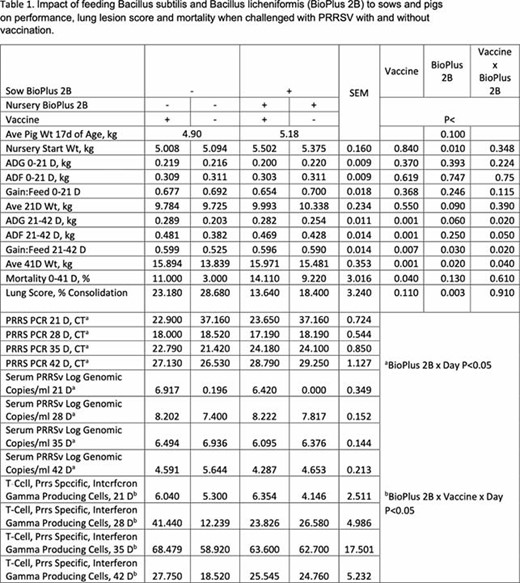-
PDF
- Split View
-
Views
-
Cite
Cite
Mark J Bertram, Steve J Kitt, Keith Kinsely, PSVI-14 Impact of Bacillus Subtilis and Bacillus Licheniformis on Weaning Weight and Subsequent Performance, Health and Immune Parameters When Challenged with PRRSV with and Without PRRS Vaccination, Journal of Animal Science, Volume 100, Issue Supplement_2, May 2022, Pages 160–161, https://doi.org/10.1093/jas/skac064.274
Close - Share Icon Share
Abstract
A study was conducted examining the impact of feeding BioPlus 2B to PRRSV naïve sows during gestation and lactation on litter performance and on post-weaning performance when challenged with PRRSV in vaccinated and unvaccinated pigs. A total of 108 sows were allotted by parity and received a control diet (C) or BioPlus 2B (B2B) supplemented diet beginning a minimum of 31 d prior to farrowing through weaning. Pig weight was measured at birth and 17 d of age. At weaning, a subset of 200 pigs from each treatment were transported to a nursery and randomly allotted within dietary treatment on day 1 to a control (-V) or Ingelvac PRRS MLV vaccine (+V), establishing treatments of C+V, C-V, B2B+V, and B2B-V. On d 21, all pigs were intramuscularly challenged with a 1-18-2 PRRS virus. Growth rate and feed intake were monitored, serological and immune measures were recorded on d 21, 28, 35 and 42, post-weaning and on d 42 gross lung lesions were recorded. Pigs from sows receiving B2B tended (P < 0.10) to weigh more at 17 d of age and 21 d post-weaning (Table 1). Prior to challenge, there were no performance differences among treatments. Post challenge, there was a V x B2B interaction with C+V, B2B+V and B2B-V pigs having higher ADG and FG (P < .05) compared with C-V. On day 42, pigs fed B2B displayed improved lung lesion scores (P < 0.05) regardless of vaccine status. PRRSV viremia, measured by PCR and qPCR decreased more quickly when pigs consumed B2B (P < 0.05). Additionally, B2B modulated PRRSV specific T-cell interferon gamma production (P < 0.05). In conclusion, pigs consuming B2B from sows fedB2B were heavier at weaning and when subjected to a PRRSV challenge post-weaning, grew faster, were more efficient, and had reduced gross lung lesions, likely due to changes in immune function.




